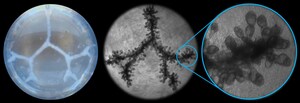Using novel tissue engineering techniques, Frontier Bio creates blood vessels using a biodegradable polymer scaffold seeded with vascular cells and grown in the lab under biomimetic conditions. Frontier Bio's innovative manufacturing methods use 3D printing to enable the production of these vessels in a variety of complex shapes, mimicking natural vascular architecture and even disease states.
As proof-of-concept, working with Mayo Clinic, Frontier Bio created a tissue-engineered blood vessel with an aneurysm and deployed a vascular flow diverter device into it. These commonly used devices direct flow away from the aneurysm, reducing the risk of further expansion or rupture. Cell growth across the flow diverter was assessed with the results comparable to those observed in the established animal studies conducted on rabbits.
This revolutionary approach to medical device testing not only aligns with evolving global ethical standards but also ensures higher accuracy and precision due to the use of human cells. It makes possible immediate impacts on the medical field, ensuring safer and more reliable testing outcomes.
"Working alongside Mayo Clinic has been pivotal in achieving this breakthrough," said Eric Bennett, CEO of Frontier Bio. "While our immediate focus is to reduce the use of animal testing by providing new tools for medical device development and evaluation, we're also enthusiastic about the long-term potential of our innovations. We envision a future where engineered tissues can transform medicine, removing the need for organ donations."
Frontier Bio's research was supported by the highly competitive National Science Foundation (NSF) Small Business Innovation Research (SBIR) program, which funds early-stage, high-impact concepts and stimulates technological innovation with more than $200 million awarded annually.
To augment their efforts, Frontier Bio is delighted to announce the addition of Dr. Samand Pashneh-Tala, an expert in tissue engineering, to their team. "Sam's expertise amplifies our capabilities, ensuring we remain at the forefront of both immediate and future advancements in tissue engineering," Bennett added.
George Church, a renowned geneticist and advisor to Frontier Bio, commented, "Frontier Bio is doing more than just creating lab-grown human tissues. They're paving the way for a future where organ donors are no longer needed, and animal testing is a thing of the past."
About Frontier Bio Corporation:
Based in the San Francisco Bay Area, Frontier Bio is a nexus of innovation in tissue engineering, steadfast in its mission to reimagine medical device testing, therapeutics development, and to save patient's lives. Their pioneering efforts extend beyond blood vessels, also encompassing the development of neural and lung tissues. With an unwavering commitment to progress, Frontier Bio is forging paths towards a medical future devoid of animal testing, while enhancing the precision and safety of medical device testing.
Learn more about Frontier Bio's endeavors at www.frontierbio.com.
SOURCE Frontier Bio







Share this article